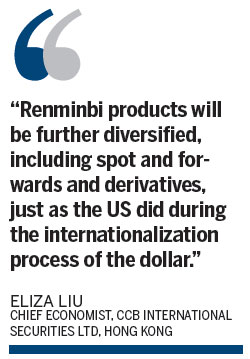Trading risks rise as RMB falls
By Lin Jing in Hong Kong (China Daily) Updated: 2014-03-12 07:21Charles Li Xiaojia, chief executive officer of HKEx, wrote in his blog on Sunday that greater risk is inevitable because the renminbi is on a path to greater internationalization and increasing volatility.
The HKEx will launch renminbi currency futures for after-hours trading on April 7 to meet demand from the European and US markets as well. It is also considering extending the maturity of renminbi currency futures to manage longer-term risk exposures.

The People's Bank of China will keep working on the convertibility of the capital account to boost investors' confidence in the yuan, said governor Zhou Xiaochuan during a news conference for the second session of China's 12th National People's Congress.
Zhou added Hong Kong is well positioned as a center for renminbi development and restrictions will be gradually removed.
In January, the currency accounted for 1.3 percent of all international payments, up from 1 percent in December, ranking it the eighth most-used currency.
Lau said that the market will see greater uncertainties as the People's Bank of China gradually loosens its controls on the yuan and more market forces participate in the formation of exchange rates.
Eliza Liu, chief economist at CCB International Securities Ltd in Hong Kong, said major investors are still keen on onshore markets because the interest spread still exists between onshore and offshore rates.
"The People's Bank of China will expand more inflow channels for offshore renminbi investors because the currency is not fully convertible right now," said Liu.
"Renminbi products will be further diversified, including spot and forwards and derivatives, just as the US did during the internationalization process of the dollar," she added.
|
 |
 |
- Top 10 trading partners of the Chinese mainland
- Top 10 most-used currencies in the world
- China yuan weakens to 6.1312 against USD Monday
- Top 10 most-used currencies in the world
- Yuan slide might be 'end of an era'
- China's yuan in record spot market fall
- Yuan on track for biggest weekly loss, market reforms in focus
- NHTSA says finds no 'defect trend' in Tesla Model S sedans
- WTO rare earth ruling is unfair
- Amway says 2014 China sales may grow 8%
- President Xi in Europe: Forging deals, boosting business
- CNOOC releases 2013 sustainability report
- Local production by Chery Jaguar Land Rover this year
- Car lovers test their need for speed in BMW Mission 3
- China stocks close mixed Monday

















